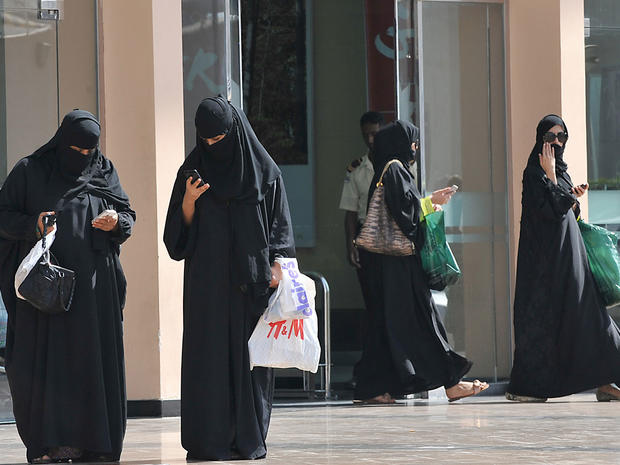Behind-the-scenes look at life for Saudi women
The boulevards of Riyadh, Saudi Arabia's capital, are lined with office towers, American fast food chains, and super-sized shopping malls. But the modern façade can't obscure a deeply conservative Islamic country.
The malls may sell mini skirts and sexy lingerie, but the female shoppers nearly all wear floor-length black gowns known as abayas, and niqabs that cover everything except their eyes. And - as is the norm in Saudi Arabia - the fast food restaurants are segregated. Men sit at the front; women and families sit in a partitioned area at the back, shielded from public view.
Saudi women are also banned from driving, and need a male relative's permission to work and travel overseas. For visitors from the West, it can be tough to digest.
- How Saudi Arabia reforms terrorists
- War on ISIS: Rare look at training to stop Saudi-born terrorists
- A look inside Saudi Arabia's fight against ISIS
But we went to Saudi Arabia to talk to Saudi women, and to find out what they think about their own society. We wanted to look behind the cliché that paints all Saudi women as veiled and therefore victimized. On a rare visit to the closed-off kingdom, we also wanted to know if there were any real signs of change.
(For more of Holly Williams' reporting from Saudi Arabia, tune in to "CBS This Morning" and "CBS Evening News" on Thursday.)
A few days after arriving in Riyadh, we visited the Starbucks near our hotel. We ordered our coffees and sat at a table outside in the sun. My producer, Erin Lyall, and I both wore head-to-toe black, and had covered our heads out of respect for local customs.
After a few moments a very apologetic staff member approached us and explained that, as women, we weren't allowed to sit at the front of the café.
"We don't have a problem," he said. "But if the religious police see you there could be trouble."
The religious police, employed by the Committee for the Promotion of Virtue and the Prevention of Vice, are tasked with implementing Islamic Sharia Law in Saudi Arabia. They can punish unrelated men and women for "intermingling" in public areas, and they enforce the dress code that is imposed on Saudi women.
Fearful the religious police would blame Starbucks for allowing intermingling to take place on its terrace, the staff member directed us to the "family" section at the rear: indoors, with little natural light.
There, we bumped into two young Saudi women who complained to us vociferously.
"We hate this," said one, as she tapped her fingernails on the counter.
During nearly two weeks in Saudi Arabia we met many other Saudis who shared their frustration with the country's strict interpretation of Islamic law -- some of them reformers within the government. One member of the Shura Council, the body that advises Saudi Arabia's all-powerful King Abdullah, told us he wanted reform in "in every aspect of life."
Saudi Arabia is clearly changing. There are now more women than men graduating from university, and the government is encouraging them to join the workforce. We met countless professional Saudi women who - despite a legal system that treats them as less-than-full citizens - occupy powerful positions in government and private companies.
There are others in Saudi Arabia -- including women -- who don't necessarily want things to change.
One of them is Um Seif, a high school teacher whose husband has two wives. Polygamy is legal under Islamic law, and still widely practiced in Saudi Arabia.
"Foreign women outside Saudi Arabia have more freedom than we do," she told us. "But I don't want to be like them. From a young age we're taught that these are our customs, and we follow them."
Balancing those very different attitudes is the challenge for King Abdullah and his government. Nobody in Saudi Arabia doubts that change is happening, but many worry that if it occurs too quickly it will prompt a backlash from religious conservatives.

